Reopening of Saudi Embassy in Tehran Further Postponed
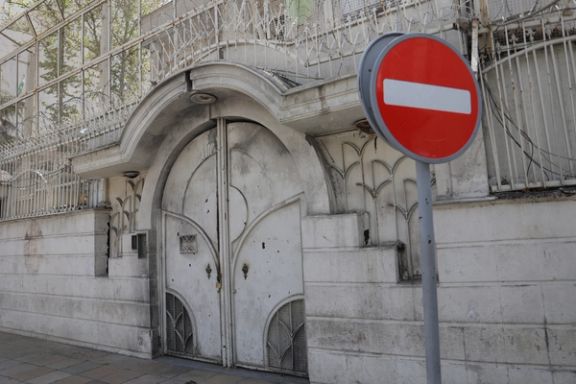
The anticipated reopening of the Saudi Embassy in Tehran, as part of an agreement to restore diplomatic relations, has faced further delays.

The anticipated reopening of the Saudi Embassy in Tehran, as part of an agreement to restore diplomatic relations, has faced further delays.
The agreement, signed in March in Beijing, stipulated that the two countries would reopen their embassies within two months. However, the timeline for the reopening of the Saudi embassy in Tehran remains unclear. Alireza Enayati, the designated Iranian ambassador to Riyadh, said that the Saudi embassy will reopen but "at a time they see fit."
Enayati expressed his observations on Saudi Arabia's approach, stating, "what we see from the notes and actions of Saudi Arabia is that the country is trying to open its embassy when it suits them." Despite not yet submitting his credentials to the Saudi authorities after being appointed as ambassador, Enayati remains hopeful for progress.
The Iranian Embassy in Saudi Arabia was reopened in mid-June, following a one-month delay, marking the restoration of diplomatic relations after seven years of closure.
In response to repeated postponements, some media outlets speculated that the Saudi embassy might reopen after the religious holiday of Eid al-Adha in late June. However, the Saudi authorities have yet to offer any official explanation regarding the possible reopening of their embassy in Tehran.
Recent reports indicated the deployment of Saudi diplomats to the Espinas Palace Hotel in Tehran's north. Jahan Sanat newspaper highlighted the hotel's strategic advantage for embassy personnel and diplomats, as it includes a helipad that enhances their security during potential emergencies or attacks.
However, the Iranian Foreign Ministry spokesperson has raised concerns about the potential establishment of relations between Saudi Arabia and Israel and how that may impact Iran. These comments come in line with comments from US President Joe Biden who indicated that an agreement on the normalization of relations between Saudi Arabia and Israel is likely.
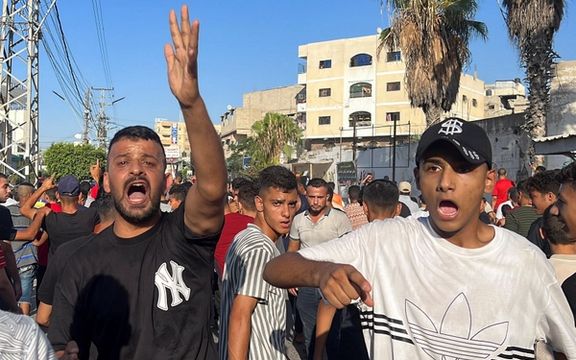
A group of children openly mocked Hamas during a demonstration in Gaza on Sunday, provoking threats to journalists.
A video on social media shows the children chanting "Shia! Shia!" in reference to Hamas' alleged ties with Shiite Iran.
Amidst the demonstration, Ihab Fasfous, a veteran Gaza journalist, found himself at the center of a confrontation with Hamas, the governing authority in the Gaza Strip.
According to witnesses, he was threatened twice by the authorities and then demanded to see identification documents of those making the threats. Despite this, he was later arrested by Hamas.
The situation has raised concerns among media organizations, particularly the Palestinian Journalists Syndicate, which has strongly condemned the actions of Hamas security forces against impartial reporters. In a statement, the syndicate also addressed an incident involving journalist Walid Abdel Rahman, a prominent member of the General Secretariat of the syndicate. Rahman, a correspondent for Palestine TV was reporting on a march in Jabalia refugee camp when he was beaten by Hamas security forces. This incident reflects a growing pattern of preventing journalists from performing their duties and covering peaceful marches across the Gaza Strip.
The Palestinian Journalists Syndicate said, "We strongly condemn the attack by Hamas security forces on journalist Walid Abdel Rahman. It is unacceptable that journalists are being subjected to violence and intimidation while simply doing their job. The syndicate stands in solidarity with all journalists facing such threats and calls for their immediate release."

Iran's has once again warned regional countries against normalizing relations with Israel as efforts intensify to expand the Abraham Accords to include Saudi Arabia.
During his weekly press conference Monday, Nasser Kanaani, the spokesperson of Iran's foreign ministry, said that normalization of ties between Saudi Arabia and Israel would harm regional peace and stability.
His remarks came as US President Joe Biden said July 28 that a deal may be on the way after talks his national security adviser held with Saudi officials in Jeddah on the issue.
The Islamic Republic, Israel's sworn enemy, has always opposed normalization of relations between Arab countries and the Jewish state. The regime has repeatedly described the two-state solution – perhaps the only peaceful way to resolve the conflict between Israel and Palestinians -- as a betrayal of the ‘Palestinian cause.’ Top Iranian officials in the past have called for the annihilation of "the Zionist entity.".
“It is quite clear that strengthening and stabilizing the position of the Zionist regime in the region has been America's first priority for many years," Kanaani said, noting that the United States has succeeded in establishing relations between Israel and several regional countries. “But what happened in practice was allowing the Zionist regime to increase its crimes against the Palestinian nation,” he claimed.
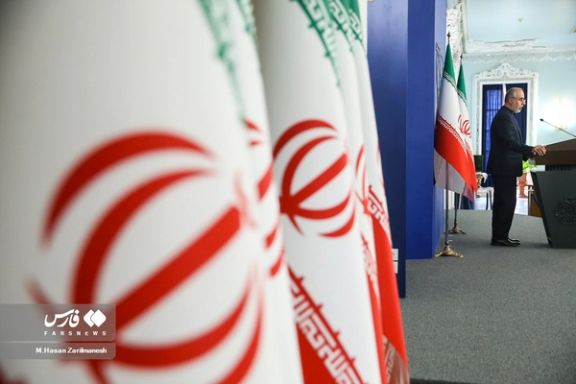
“Peace with the Zionist regime will not help the Palestinian nation; Iran considers any step taken towards the recognition of the regime neither in the interest of Palestine nor in the interest of peace and security in the region,” Kanaani said in a tacit threat that could potentially lead to further unrest in the region by Tehran’s proxies.
In June, Jaber Rajabi, a political analyst and activist, told Iran International that although the Islamic Republic seeks to portray itself as sympathetic to the Palestinians and championing their cause, it never supports those Palestinians who seek peace and stability, such as the Palestine Liberation Organization, and only supports militant groups.
Rajabi said that the Islamic Republic is not committed to what he described as the Palestinian cause, noting that the regime views the Palestinian issue as a bargaining chip. Among the few cards that the Islamic republic can play in the international arena is fomenting unrest in Israel, he claimed, adding that the regime believes it can only make gains if there is a crisis.
In April, Supreme Leader Ali Khamenei claimed that Israel is on the defensive, and the United States has suffered major setbacks and consecutive defeats in the region.
During the Monday press briefing, Kanaani also claimed that Iran is pursuing a policy of good neighborliness and seeks to resolve disputes with neighboring states through dialogue. However, he reiterated that the regime will not tolerate a violation of its rights over a disputed Persian Gulf natural gas field shared with Kuwait and Saudi Arabia.
Called Arash in Iran and Durra or Dorra by Saudi Arabia and Kuwait -- the offshore field was discovered in 1967 and is estimated to have a total proven reserves of around 310 million barrels of oil and 20 trillion cubic feet of gas. Kuwait and Saudi Arabia insist that Iran has no right over the field, claiming “exclusive” right, while Iran says any development without its consent is “illegal” according to international laws as it claims 40 percent of the field located in its territorial waters.
“Iran believes that such issues should be discussed within the framework of technical, specialized, and legal negotiations and that it is not helpful to raise them in the media,” Kanaani emphasized.
His remarks – as well as similar ones by the country’s oil minister on Sunday – came after Kuwait's oil minister Saad Al Barrak told SkyNews Arabia July 27 that his country will start drilling and begin production at the gas field without waiting for border demarcation with Iran, reiterating the two Arab countries’ position that Iran must validate its claim to the field by demarcating its own maritime borders first.
As controversies surrounding the case are escalating, the disputed maritime field in the Persian Gulf has become a litmus test for the recent détente between Tehran and Riyadh.
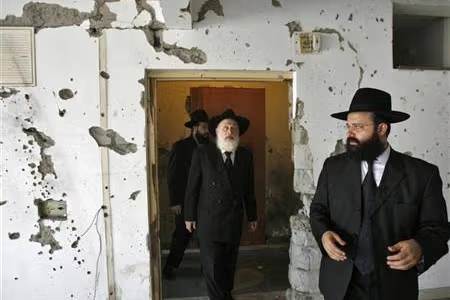
The two men recently detained in India for planning to attack a Jewish center in Mumbai are suspected to be linked to Iran’s Islamic Revolutionary Guard Corps (IRGC).
The suspects planned to carry out bombings at several sites including the Chabad House Jewish Center in Mumbai, which was the site of a deadly attack in 2008.
Mohammed Imran and Mohammed Yunus Saki were apprehended in Pune in possession of explosives, drone equipment, laptops, and incriminating books in Arabic.
The investigation into the local Islamist terror group known as Al-Sufa led to the arrests, with documents discovered on one of the suspect's phones. The Chabad House was targeted in 2008 by Islamist Pakistani gunmen during a series of attacks in Mumbai, resulting in the deaths of seven people.
Apart from the 2008 Chabad attack, there have been other terror attacks on Israeli and Jewish targets in India. In 2021, a blast outside the Israeli embassy in New Delhi damaged cars but caused no injuries, with India attributing the attack to the Quds Force branch of Iran's IRGC.
During the past two years, Israel foiled attacks organized by the IRGC-affiliated agents in countries including Georgia, Turkey and Cyprus all aimed at killing citizens of Jewish origin.
Israel's National Security Council has also warned of continued attempts by Tehran to target Israelis worldwide, particularly in countries near Iran in West Asia, such as the United Arab Emirates, Georgia, Azerbaijan, Turkey, Bahrain, and Iraq's Kurdistan region.
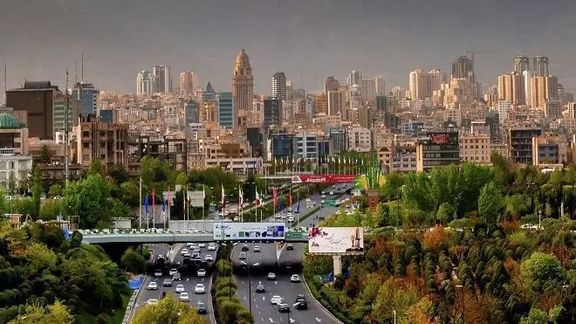
Amidst fears of a devastating earthquake in Tehran, a City Council member issued a stern warning about its potential impact.
Mohammad Aghamiri emphasized that if an earthquake were to strike the capital, which is located in an area of high seismic activity with these the risks compounded by increasing land subsidence, the city’s current infrastructure would not withstand and a national crisis would ensue.
Aghamiri spoke to Etemad newspaper, expressing his deep apprehensions about the current subsidence situation in Tehran, terming it unacceptable and extremely worrying. Recognizing the gravity of the issue, he stressed the crucial need for national support to effectively address and contain the looming threat.
"If an earthquake occurs in Tehran, the capital, which should itself be the command center, will experience a crisis," he said.
His concerns align with the sentiments expressed earlier this year by Mehdi Pirhadi, another member of Tehran City Council, who also underscored the urgency of renovating buildings in the capital to withstand potential earthquakes. Pirhadi emphasized that a quake with a magnitude of over 7 could lead to hundreds of thousands of casualties and deaths, due to 166,000 hectares of worn-out structures across the country.
In light of this grim outlook, experts have predicted that in the event of a magnitude 7 earthquake, at least one and a half million people could lose their lives in Tehran alone.
Iran, situated at the convergence of the Arabian, Indian, and Eurasian tectonic plates, is known for its high seismic activity, making it one of the most earthquake-prone countries in the world. The nation has experienced several massive earthquakes in recent history, resulting in tens of thousands of casualties and substantial economic losses.
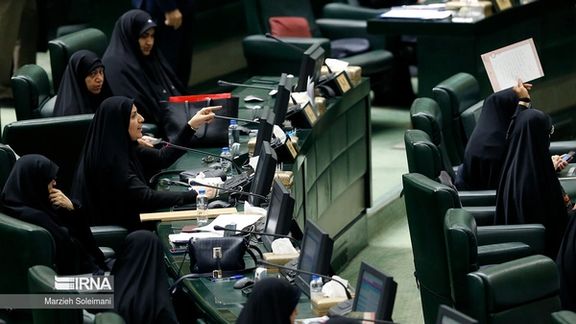
Legal experts say Iran’s new hijab bill violates not only civil rights but also the Constitution and requires vast resources beyond the government’s means.
Speaking to Tejarat News, a website in Tehran, lawyer Sara Bagheri said the proposed legislation is against individuals’ rights including their right to security and will hurt individuals’ reputation and dignity on account of their chosen style of clothing.
Referring to article 51 of the proposed law which prescribes heavy cash fines for unveiling in public, Bagheri said what is considered as crime, and the corresponding punishment in this article and others, are very disproportionate. “Also, the bill does not make it clear what will happen if the person [found guilty] refuses to pay the fine,” she added.
Shima Ghousheh, a law expert, wrote in a commentary published by the reformist Etemad newspaper on Saturday, "The country’s whole budget should be used to build prisons for women because many Iranians will not be able to pay these [heavy] fines and should be sent to prison." She pointed out that the punishments for unveiling or "improper" hijab are much heavier than those prescribed by law for financial crimes, including embezzlement and drug-related offenses.
The hijab bill bans taking photos or videos of police while enforcing hijab but two of its articles, 36 and 37, allow law enforcement officers as well as civilians, provided that they have been trained and certified by the police, to take photos of the person violating the hijab law and post it to a special police portal. They will also be authorized to report businesses that have failed to comply with the provisions of the new hijab law.

These two articles open the door to libel based on personal grudges against individuals, even when they have been compliant with the rules, and courts will have to deal not only with hijab infringement cases but also a vast number of legal cases resulting from personal grudges, experts say.
Since March, hardliners have attempted to end women's increasing defiance of compulsory hijab and reclaim lost ground through various instructions to government bodies, but their efforts seem to have hugely backfired as the number of women who refuse to abide by the current rules has noticeably increased.
In a commentary published by Etemad, well-known Iranian lawyer Kambiz Nowrouzi strongly criticized a recent directive by Gilan Medical Sciences University, an affiliate of the health ministry, that bans hospitals under its coverage from offering services to unveiled women and called it "an astounding and horrendous example of violation of the [existing] laws and ethics."
Law expert Omid Salimi-Bani told the conservative Khabar Online news website Saturday that the bill, if approved, will add thirty new types of crimes to the list of crimes in the Islamic Republic’s existing laws.
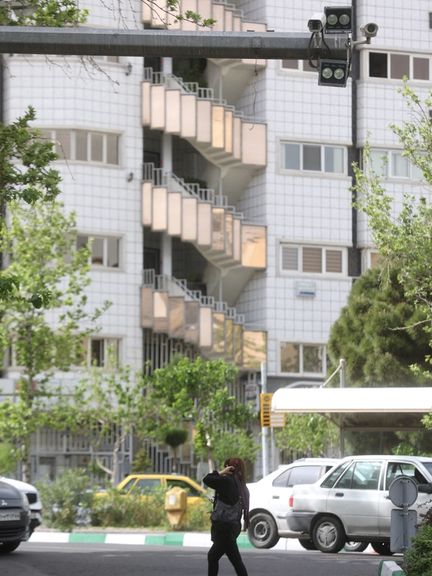
Some of the other “crimes” enumerated in the bill include “promoting unveiling” which may be considered as corruption on earth that bears a death penalty , “insulting the principle of hijab” which will be punishable by a cash fine of 1 billion rials ($2,000) for the first infringement, as well as designing, advertising or importing banned clothing, and refusal of businesses to submit their CCTV recordings to authorities for identification of unveiled women.
“Are these behaviors so abominable from the point of view of societal norms and people that they require punishment? It doesn’t seem that the majority of people think the same as those who have written the bill,” he said.
“State and government culture-building has proven to be a failure and the Iranian example is one of the best,” reformist Ham-Mihan newspaper wrote Sunday and suggested holding a referendum to find out what most Iranians think about the issue of hijab.
The regime and its Supreme Leader Ali Khamenei have always refused suggestions of referendum which Article 59 of the Constitution of the Islamic Republic, which was approved by a referendum after the Islamic Revolution of 1979, proposes in “extremely important economic, political, social, and cultural matters.”